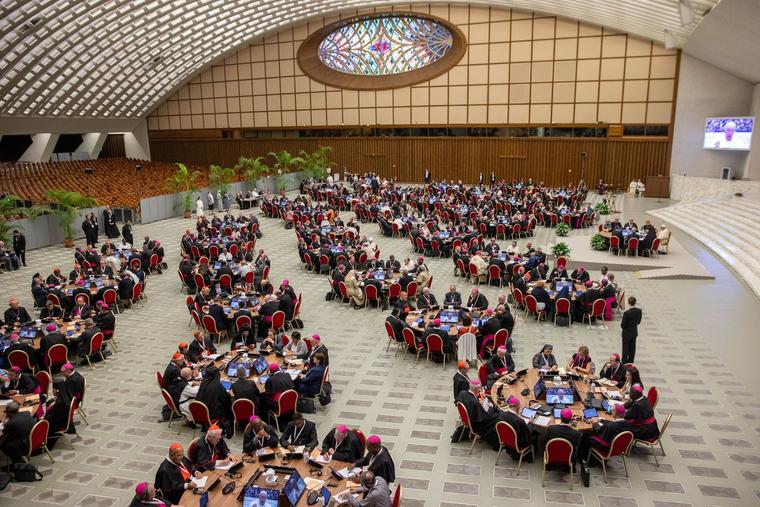- Feb 5, 2002
- 166,654
- 56,277
- Country
- United States
- Faith
- Catholic
- Marital Status
- Married
- Politics
- US-Others
NEWS ANALYSIS: Only select members are taking part in small-group discussions on hot-button topics like LGBTQ inclusion and women deacons.
This week and next, the Synod on Synodality is focusing on issues like LGBTQ inclusion and the possibility of opening the diaconate to women — some of the most contentious matters on the gathering’s monthlong agenda.
But contrary to what some may have assumed, not all of the synod’s 364 delegates will have a chance to weigh in on these topics equally. In fact, synod organizers have assigned only some of the members to the small groups discussing these hot-button issues, after members indicated ahead of time what topics they’d prefer to focus on.
It’s a dynamic that could skew the table reports issued on a given topic and, in turn, affect the text summarizing the views of the assembly that will be finalized at the end of the process.
The possibility is a product of the unique way organizers have arranged discussions at this year’s synod.
Unlike previous synods, where members were broken into different language groups but focused on the same topics, the 35 tables in Paul VI Hall for this year’s gathering are divided not just linguistically, but also thematically, for most of the synod’s proceedings.
What this means, in concrete terms, is that while some members have been engaging for the past few days in small-group discussion on the inclusion of LGBTQ-identifying people and remarried divorcees in the life of the Church, others have been focusing on topics like ecumenism and welcoming migrants.
Continued below.

 www.ncregister.com
www.ncregister.com
This week and next, the Synod on Synodality is focusing on issues like LGBTQ inclusion and the possibility of opening the diaconate to women — some of the most contentious matters on the gathering’s monthlong agenda.
But contrary to what some may have assumed, not all of the synod’s 364 delegates will have a chance to weigh in on these topics equally. In fact, synod organizers have assigned only some of the members to the small groups discussing these hot-button issues, after members indicated ahead of time what topics they’d prefer to focus on.
It’s a dynamic that could skew the table reports issued on a given topic and, in turn, affect the text summarizing the views of the assembly that will be finalized at the end of the process.
The possibility is a product of the unique way organizers have arranged discussions at this year’s synod.
Unlike previous synods, where members were broken into different language groups but focused on the same topics, the 35 tables in Paul VI Hall for this year’s gathering are divided not just linguistically, but also thematically, for most of the synod’s proceedings.
What this means, in concrete terms, is that while some members have been engaging for the past few days in small-group discussion on the inclusion of LGBTQ-identifying people and remarried divorcees in the life of the Church, others have been focusing on topics like ecumenism and welcoming migrants.
Continued below.

Synod on Synodality’s New Methodology Could Skew Reports on Controversial Issues
NEWS ANALYSIS: Only select members are taking part in small-group discussions on hot-button topics like LGBTQ inclusion and women deacons.
